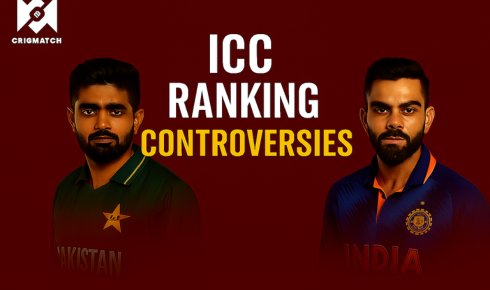ICC Ranking Controversies

Cricmatch
Cricket rankings are meant to reflect performance, consistency, and supremacy across formats. The International Cricket Council (ICC) introduced its official ranking system to provide clarity and fairness. Yet, over the years, these rankings have often sparked debate. Whether it’s team positions, player standings, or methodology itself, ICC ranking controversies continue to capture attention and stir discussions among players, experts, and fans.
The Purpose of Rankings
The ICC ranking system was designed to measure performance objectively:
- Team Rankings: To track which nations dominate in Tests, ODIs, and T20Is.
- Player Rankings: To evaluate batters, bowlers, and all-rounders based on form and contributions.
- Fair Competition: To ensure transparency in tournament seedings and qualification.
While the intention is noble, the execution has not always been free of disputes.
Historical Disputes
Several controversies have shaped the narrative around ICC rankings.
- Test Rankings and the “Points Gap”: Teams often leapfrog others despite not playing each other directly. For instance, debates arose when South Africa briefly became No. 1 in Tests despite not dominating recent series.
- ODI Rankings in World Cup Years: India, Australia, and England have frequently swapped top positions in ways critics argued were influenced by scheduling advantages.
- Player Rankings Inconsistency: Instances where a batter who missed matches retained a high rank while an in-form player moved up slowly. This created confusion among fans about the fairness of the algorithm.
These examples highlight how statistical formulas don’t always align with public perception.
Methodology Concerns
At the heart of many controversies lies the ranking methodology.
- Weightage of Matches: Recent matches are given more weight, but critics argue this undervalues long-term consistency.
- Opposition Strength: Playing against weaker teams often contributes fewer points, even if performances are dominant.
- Home vs Away Bias: Some argue that rankings don’t adequately reward success in tough away conditions.
- Inactivity Issues: Players can retain positions despite long absences due to injury or rest, leading to debates about merit.
The lack of transparency in the exact calculations further fuels mistrust.
Player Ranking Debates
Individual rankings have drawn particular scrutiny:
- Batting Rankings: Virat Kohli, Babar Azam, and Steve Smith have often exchanged the top positions, sparking heated debates among their fan bases. Questions arise when small changes in form cause sudden fluctuations.
- Bowling Rankings: Critics note that bowlers from subcontinental teams sometimes climb slowly despite consistent performances, compared to peers from Australia or England.
- All-Rounder Rankings: These have often been called outdated, as the weighting system doesn’t always reflect modern all-round contributions in T20 cricket.
Fans often perceive rankings as more political than mathematical, further intensifying controversies.
Tournament Seeding and Impact
Ranking controversies don’t just stop at perception—they also affect tournament seedings and qualification.
- World Test Championship (WTC): Points distribution has been criticized, with rain-affected matches and series weightage impacting final standings.
- ODI Super League: The qualification pathway for the World Cup based on rankings and points faced criticism for being uneven.
- T20 World Cup Seeding: Teams often argued that seedings did not reflect their actual momentum heading into tournaments.
These issues suggest that ranking controversies can directly influence outcomes at major ICC events.
The Fan Perspective
For fans, rankings are more than just numbers—they are symbols of pride and bragging rights. When rankings appear inconsistent or biased, backlash is inevitable. Social media platforms often explode with debates, with fan groups accusing the ICC of favoritism or flawed systems.
The passion of cricket followers ensures that any controversy around rankings quickly becomes a global talking point.
Suggestions for Reform
Experts and players have suggested multiple ways to make ICC rankings fairer and more transparent:
- Greater Transparency: Publishing exact calculation methods would build trust.
- Balanced Weighting: Giving fair value to both long-term performance and recent form.
- Contextual Points: Considering match situations, such as chasing under pressure or bowling in batting-friendly conditions.
- Regular Reviews: Independent panels could periodically assess whether the system reflects actual performances.
Such reforms could minimize controversies while maintaining credibility.
Final Thoughts
ICC rankings were created to provide clarity, but over the years, they’ve often done the opposite—sparking debate and controversy. Whether it’s teams leapfrogging without clear justification or players retaining rankings despite inactivity, the system remains imperfect.
However, rankings continue to play an essential role in structuring tournaments and fueling fan discussions. Instead of discarding the system, the ICC must focus on reform and transparency to restore faith.
For fans eager to track real-time standings, debates, and expert opinions on global rankings, the Cricmatch platform and the Cricmatch register gateway provide reliable insights, keeping followers engaged with every twist and turn in the cricketing world.



